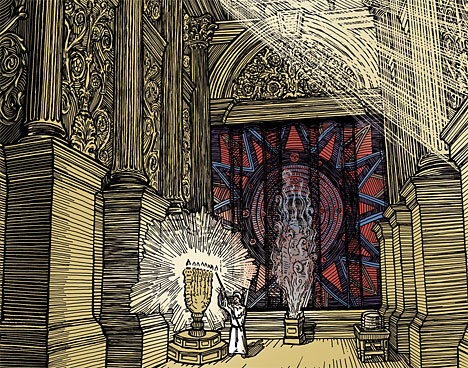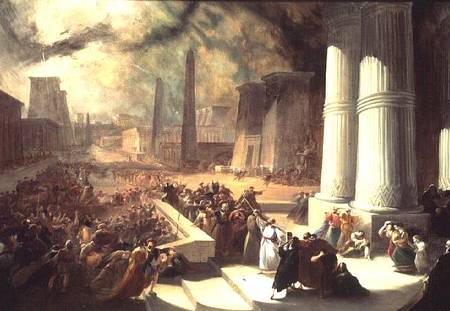Feb
22
2012

One problem with modern conservative scholarship is its reluctance to deal with types that are not explicitly described in the text. This means that a lot of what is considered interpretation is merely application.
Aside from those types which are explicitly explained, the typological nature of Biblical history is rejected. Thus most of its “bandwidth” remains unheard. The result of this severe “downsampling” is that a lot of that application is off-the-mark because a clumsy search for a moral to the story has taken the place of the typological message. The principles drawn from the histories are not universals but abstracts, because we are looking for morals, not looking at men made in the image of God.
[This post has been refined and included in Sweet Counsel: Essays to Brighten the Eyes.]
Continue reading
Comments Off | tags: Hermeneutics, James Jordan, Judges, Preaching, Typology | posted in Biblical Theology, Quotes
Feb
8
2012
Atonement and Enthronement

“Jesus does what no medicine man
or witch doctor is able to do.”
And they came to Jesus and saw the demon-possessed man,
the one who had had the legion, sitting there,
clothed and in his right mind, and they were afraid. – Mark 5:15
Rich Bledsoe’s old blog is a goldmine. Here’s an excerpt from The Dysfunctional Family of the Gadarene Madman.
Continue reading
Comments Off | tags: Abel, AD70, Atonement, Cain, Circumcision, Edwin Friedman, Feasts, Genesis, James Jordan, Job, Matthew, Rene Girard, Revelation, Rich Bledsoe | posted in Biblical Theology, Quotes, The Last Days
Jan
27
2012
or Riffing on Moses

The Lord’s name might not be mentioned explicitly in the book of Esther (though some scholars see it hidden in the text), but as literature it is riddled with riffs on the patterns found in the Law and the Prophets. We don’t see it because we don’t interpret “musically,” that is, looking for recurring themes. [1]
Continue reading
Comments Off | tags: Covenant Theology, Deuteronomy, Esther, Feasts, James Jordan, Literary Structure | posted in Bible Matrix, Biblical Theology, The Restoration Era
Jan
16
2012

The word apocalypse does not denote the end of the world. It is literally a revelation, a revealing.
In his Pauline Theology paper, It’s the end of the flesh as we know it! A comparison of circumcision & apocalypse (2010), Steven Opp provides support for the identification of the book of Revelation as a Covenant lawsuit. Christ was circumcised, then Christ Himself was cut off. Israel was circumcised in Christ, then, in AD70, after decades of apostolic gospel witness, unbelieving Old Covenant Israel and its Temple worship, overseen by “the mutilation,” were cut off. On the final Day of Coverings, the flesh was exposed.
Continue reading
Comments Off | tags: Circumcision, Covenant Theology, Galatians, James Jordan, Paul, Peter Leithart, Power of the Gospel, Revelation, Steven Opp | posted in Biblical Theology, Quotes, The Last Days
Dec
19
2011

The systematic typology of the Bible Matrix allows us to follow the structures of the Torah thoughout the rest of the Bible. Here’s something that links the Restoration era with the book of Deuteronomy.
Continue reading
Comments Off | tags: Baptism, Deuteronomy, Esther, Exodus, James Jordan, Jeremiah, Mordecai, Moses, Systematic typology, Tabernacle, Ten Commandments, The Law | posted in Biblical Theology, Quotes, The Restoration Era
Dec
9
2011

The Living Dead and the Dead Living
Creation: In part 1 we saw that the theme of the first stanza of 2 Thessalonians 2 was the “Sabbath” rest of the church. Paul writes to remove the alarm caused by the “conspiracy theorists” who attempted to disturb it.
Division: The second stanza concerned the splitting of the church into two — those who would persevere despite the growing threat of tribulation throughout the empire [1], and those who would succumb to their fears. The attacks would culminate in the completion of Herod’s Temple and the Nero’s burning of Rome in AD64. The first threw doubt upon the words of Christ concerning the Temple, and the second, though hardly believed, was an excuse to scapegoat this new Jew-Gentile sect, now legally separated from the protection afforded to Jews by Rome. The gospel tore Judaism in two. Then it united those believing Jews with Gentiles. But as in the wilderness, new Israel would be threshed and purified.
Continue reading
Comments Off | tags: AD70, Atonement, Booths, Dispensationalism, Feasts, James Jordan, Literary Structure, Paul, Ray Sutton, Revelation, Ten Commandments, Thessalonians | posted in Bible Matrix, Biblical Theology, The Last Days
Nov
11
2011

“In Genesis 1, God creates the world in six days, through certain steps. Then He creates human beings out of ‘world,’ and human beings made out of world are going to live like ‘world’ does. They are going to go from darkness to light, formlessness to form; they are going to marry and take dominion. They are going to become like lights ruling over the earth. They’re going to live in 24 hour cycles. They will undergo times when God pulls them apart and puts them back together in new ways–all because they are made out of world. And these are all steps of glorification.” — James B. Jordan (The Bible You Never Read)
Some Christians assert that Adam was not the first man, only the first man in Covenant with God. [1] This means that the judgments upon such a Covenant could only be social, not “Creational.” They could only fall upon those under Covenant, not the “pre-Adamic” people from which this Covenant separated Adam. This assertion must be made to support the view that the Great Flood was only a local event, destroying only the “Adamites,” not all people on the planet. Does this assertion have any support in Scripture? Apparently yes, but factually no.
Continue reading
2 comments | tags: Abraham, Covenant Creationism, Covenant Theology, Flood, Gnosticism, James Jordan, Noah | posted in Against Hyperpreterism, Biblical Theology, Creation, Quotes, The Last Days
Oct
31
2011
or The Cultic Core of Revelation

“Revelation is not just a vision of the King of Kings,
but of the King of Kings in His court.”
Preterists have a go at dispensationalists for interpreting the Bible through the lens of current headlines. We recognize that the Bible must be interpreted in its historical context, for its “first audience.” But there’s a brand of “newspaper exegesis” that plagues preterism as well.
Continue reading
Comments Off | tags: Dispensationalism, Ezekiel, James Jordan, Josephus, Kenneth Gentry, Moses, Preterism, Revelation, Tabernacle | posted in Biblical Theology, Quotes, The Last Days
Oct
30
2011

Here’s the amazon description of Christian Smith’s recent book, The Bible Made Impossible.
Biblicism, an approach to the Bible common among some American evangelicals, emphasizes together the Bible’s exclusive authority, infallibility, clarity, self-sufficiency, internal consistency, self-evident meaning, and universal applicability. Acclaimed sociologist Christian Smith argues that this approach is misguided and unable to live up to its own claims. If evangelical biblicism worked as its proponents say it should, there would not be the vast variety of interpretive differences that biblicists themselves reach when they actually read and interpret the Bible.
Smith describes the assumptions, beliefs, and practices of evangelical biblicism and sets it in historical, sociological, and philosophical context. He explains why it is an impossible approach to the Bible as an authority and provides constructive alternative approaches to help evangelicals be more honest and faithful in reading the Bible. Far from challenging the inspiration and authority of Scripture, Smith critiques a particular rendering of it, encouraging evangelicals to seek a more responsible, coherent, and defensible approach to biblical authority.
Continue reading
2 comments | tags: Compromise, Hermeneutics, James Jordan, Peter Leithart | posted in Apologetics, Biblical Theology, Quotes
Oct
24
2011

“He comes to make His blessings flow, far as the curse is found…”
And [Moses] said, (T) (Creation)
…..“If you diligently heed the voice of the LORD your God (H) (Division)
……….and do what is right in His sight, (Ascension)
……………give ear to His commandments (E) (Testing)
……….and keep all His statutes, (Maturity)
…..I will put none of the diseases on you (O) (Conquest – Blessing)
…..which I have brought on the Egyptians. (Conquest – Cursing)
For I [am] the LORD who heals you.” (S) (Glorification)
— Exodus 15:26
“QuantumGreg” posted a comment on Sam Frost’s review of my book. He objects to the idea that, under the New Covenant, obedience to the Law will bring a decrease in disease. It’s a very reasonable objection.
“…does this not sound like Law to you? In fact, it is the Law (Deuteronomy 28). It sounds so much like the Old Covenant that it has no resemblance to the New Covenant, don’t you think?
Continue reading
10 comments | tags: Covenant curse, Covenant Theology, Exodus, James Jordan, Postmillennialism | posted in Biblical Theology, Christian Life, Quotes



































